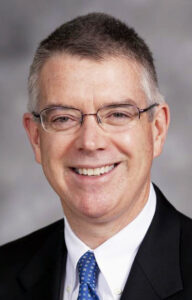By Dr. Tim Millea
Catholic Health Care Today

While driving down a residential street, I noticed a young family out for a late afternoon walk. Mom and dad had their child in a stroller and their well-behaved dog on a leash. I was struck by two observations. The less striking was that both parents were staring at their phones and a screen that their toddler was holding obscured his or her face. The more striking image to me was the dog. As I drove by, the dog raised his head and looked directly at me. He didn’t need to say what his canine heart was experiencing. His face, and especially his eyes, expressed true loneliness. Despite being surrounded by people, that dog seemed to know what it is to be alone. If “man’s best friend” can be afflicted with a feeling of isolation, are we at risk as well? Sadly, the answer seems to be a worrisome “yes.”
Over the past decade, reports of a “loneliness epidemic” in the U.S. are increasing. Even prior to the pandemic, social scientists raised alarms, which expanded with the pandemic’s arrival. In May 2023, the U.S. Surgeon General released an advisory statement declaring a “public health crisis of loneliness, isolation, and lack of connection in our country.” Similarly, other countries including the United Kingdom and Japan have appointed a “minister of loneliness” to address the negative effects of this problem.
Why is loneliness so worrisome? Its detrimental effects extend well beyond the emotional and psychological realms. Studies cited in the Surgeon General’s report have documented a 29% increased risk of heart disease and a 32% increased risk of stroke for those with poor interpersonal connections. Older adults experiencing loneliness have a 50% higher likelihood of developing dementia.
However, it is not only our older neighbors who are at risk. A 2019 study by researchers at the University of California at Berkeley reported an ironic finding. In spite of larger social networks, young adults reported lonely days at a rate double those for middle-aged adults. It appears evident that the size of the social network is not nearly as critical as the quality of its relationships. Similar concerns appeared in the 2021 “American Perspectives Survey,” which noted that Americans have fewer close friends than in prior years. Sadly, approximately 10% of those surveyed reported having no friends at all.
We often point the finger of blame at social media as the contributing factor to personal isolation. It is true that inordinate use of social media is associated with mental health issues. However, does that connection hold true with loneliness? Many people who feel isolated and lonely often engage with social media in an attempt to form connections and feel an importance to others. With a complex problem such as loneliness on a societal scale, it is unlikely that a single cause such as social media can produce this widespread problem.
Of course, the various factors producing loneliness warrant further investigation. However, rather than waiting for an explanation, it is critical that we take measures to reverse this downward spiral of relationships now. The Surgeon General’s report lists several recommendations, including a strengthened social infrastructure and mobilization of the health care system to recognize those at risk for loneliness-related illness. While the recommended tactics are commendable, they describe a governmental “top-down” approach, with the exception of the final recommendation: “cultivate a culture of connection.” That is a strategy that we as Catholics are called to carry out.
In the “Catechism of The Catholic Church,” paragraph 1939 outlines the principle of solidarity as a “direct demand of human and Christian brotherhood.” If there is a disregard for friendship and attention to others, that solidarity erodes and the wider community suffers. We are all aware of our responsibility to share our material gifts with those in need. In this environment of increasing solitude, our neighbors are also in dire need of the spiritual, emotional and physical benefits that arise from the development of friendships. All of us are tasked with a mission of care and compassion for others that begins with friendship and leads to an accompaniment that continually strengthens those bonds, with God as the focus of the relationship.
No one recognized poverty with greater clarity than St. Teresa of Kolkata, who observed that “The most terrible poverty is loneliness and the feeling of being unloved.” We are all in this earthly journey together, called to care for our neighbors, which happens only by developing relationships with them. We must step out of our comfort zones and find those who need social bonds and friends. We must take this initiative seriously and bring our society back from the depths of seclusion and loneliness into a community of Christian fellowship.
(Dr. Tim Millea is president of the St. Thomas Aquinas Medical Guild and a member of St. Paul the Apostle Parish in Davenport.)











